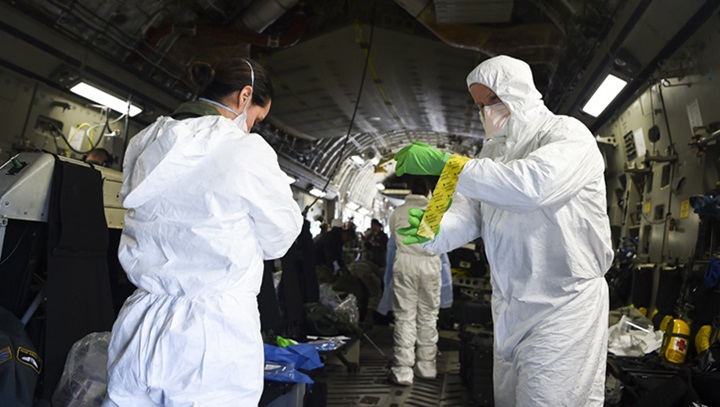What To Do When You Receive a Force Majeure Claim – Coronavirus
Start with the Clause – Coronavirus
Coronavirus… A force majeure clause is a common inclusion to contracts for protecting parties from impairment caused by extraordinary or extreme events. These extraordinary events are often referred to as “acts of God”. When a force majeure clause has been included in a contract and force majeure events actually do occur, the expectation is that the party or parties facing impairment as a result of the proscribed force majeure event–a hurricane, war, flooding, political unrest, epidemic, etc.–will be relieved of all or some portion of its delivery obligations under the relevant contract and from all or some portion of liability for damages arising from delay or default occurring in the performance of its contractual obligations.
In drafting these provisions, companies will often use language that defines what will or will not constitute a force majeure event, often by listing specific examples which qualify as such–hurricanes, war, volcanic eruptions, strikes, lockouts, etc. Occasionally, in the rush to get the deal done, not a great deal of thought is given to the breadth or inclusions expressed in the clause and a “boilerplate” is used.
If there is no force majeure clause, courts will still consider defences by the impaired party based on foreseeability of the impairing event. Whether there is a force majeure clause or not, the burden of proof rests on the party seeking to rely upon the force majeure provision. In any case, the key starting point is with the force majeure clause itself. What does it say? Do the events which one party alleges to have occurred actually qualify under the terms of the clause? If so, did those qualifying events actually lead to the delay or the breach in question?
Force Majeure Case Law in Canada
For the past half-century, the leading case on force majeure in Canada has been Atlantic Paper Stock Ltd. v St. Anne Nackawic Pulp & Paper Co. This was a 1975 Supreme Court decision concerning a minimum annual supply of paper pulp over a 10-year period, which allegedly became subject to extraordinary events including acts of God and substantial decline in the market for such paper pulp. In this decision, Justice Dickson established that, “An act of God clause or force majeure clause … generally operates to discharge a contracting party when a supervening, sometimes supernatural, event, beyond control of either party, makes performance impossible. The common thread is that of the unexpected, something beyond reasonable human foresight and skill” (emphasis added). Since then, no Canadian Supreme Court cases have revisited the matter in depth. However, despite the lack of Supreme Court precedents, there have been various lower-court cases affirming Atlantic Paper and exploring the interpretation of force majeure clauses.
In World Land Ltd. v Daon Development Corp., the court accepted the use of basket clauses to define the scope of force majeure applicability. In this case, a land development company was accused of failing to commence construction on the land by a specific date. In the agreement, the force majeure clause included in its definition of force majeure events, the very broad and inclusive language, “…or any other causes…beyond the control of the vendors or the purchasers”. The company had relied on this language and announced that the development would be delayed on the grounds of not having received a development permit, which it claimed was beyond its control. The court accepted the applicability of the basket clause. However, to the detriment of the land development company, it chose to interpret the language plainly and held that it had been within the company’s control to obtain the permit on time. In other words, the party alleging that force majeure events occurred was not entitled to sit idle. Coronavirus.. now what?
Subsequently, Atcor Ltd. v Continental Energy Marketing Ltd. seemed to have revised the criteria for what constitutes a force majeure event. In this decision, a gas supplier successfully relied on force majeure when it failed to deliver gas because of various technical pipeline issues suffered by a third party pipeline owner. Here, the Alberta Court of Appeal rejected the idea that a force majeure event had to make performance impossible. Instead, “a real and substantial problem” that makes contractual performance commercially unfeasible was held to be the standard—i.e. a significantly lower threshold than the impossibility of performance standard posited in Atlantic Paper, cited above. Despite the apparent departure in Atcor, the impossibility standard set in Atlantic Paper has continued to be followed in recent cases. Thus, from a practical viewpoint, unless you have expressly contracted otherwise, ‘impossibility of performance’ should be viewed as the basic standard when reviewing force majeure circumstances.
As if to emphasize this point, in the 2011 British Columbia Supreme Court decision Domtar Inc. v Univar Canada Ltd., there was a focus on language of the force majeure provision. The facts were that a supplier could not source and supply caustic soda on commercially acceptable terms and, therefore, alleged that an event of force majeure had occurred and that it should be exempted from its contractual supply obligations. The force majeure event, in this case, was not being able to purchase raw materials at a commercially acceptable price because of an unprecedented rise in price of caustic soda. The argument was ultimately unsuccessful. The B.C. court found that the force majeure clause in the relevant contract did not include or contemplate economic or market conditions, and agreed with earlier findings from the English courts that, “the fact that a contract has become expensive to perform, even dramatically more expensive, is not a ground to relieve a party on the grounds of force majeure.”
Domtar Inc. suggests that “economic” force majeure would be extremely difficult, if not impossible, to justify. It also emphases the point which we made above—start by reading the force majeure clause in your contract. Coronavirus facts…
Considering the Novel Coronavirus
It is not uncommon for force majeure clauses to include specific references to terms such as “plague” or “epidemic” when describing force majeure events. In light of global health emergencies that have surfaced in the last few decades, we have found that these types of clauses have included increasingly specific event references such as “public health emergencies” and “communicable disease outbreaks”. However, whether these specific wording inclusions will be of use to the party alleging that a force majeure event which can be relied upon as relieving it from its contractual obligations has occurred remains uncertain. Have you been tested for Coronavirus?
The Canadian case law surrounding force majeure provisions based on global health concerns is limited. For example, most mentions of the 2003 SARS outbreak or the 2015 Ebola pandemic pertain to cases of domestic occupational health and safety and refugee protection. Reported cases that refer to these specific health crises as triggers of force majeure are few. There is one 2005 decision issued by the Canadian Radio-television and Telecommunications Commission (CRTC) concerning rate adjustment plans in the Telecom industry that linked SARS to a force majeure event. In the decision, Bell Canada, TELUS, and several other telecom companies submitted that the 2003 SARS outbreak in Toronto fell within the scope of the following force majeure clause:
“No penalty shall apply in a month where failure to meet the standard is caused, in that month, by fire, strikes, default or failure of other carrier, floods, epidemics, war, civil commotions, acts of God, acts of public authorities or other events beyond the reasonable control of the Company which cannot reasonably be foreseen or provided against.”
In this case, Canadian telecom carriers sought to rely upon the force majeure wording above, arguing that factual circumstances, including the necessity to quarantine of a number of Bell Canada employees, and the specific mention of “epidemics” in the force majeure clause, lessened their respective quality of service obligations. (In many force majeure clauses, epidemics are not specifically included in the clause and left to be read-in under the sweeping category “other events beyond the reasonable control of the Company”.) In the end, the CRTC held that the approach to be adopted in order to determine whether or not SARS-related events were sufficient to trigger force majeure clause protections was a case-by-case one.
Have you been classed in Auto insurance as a high risk driver in Ontario? Visit the high risk auto pros online and get an instant car insurance quote.
Are you an entrepreneur? Perhaps you’re a business owner looking for commercial insurance? Public Liability, Commercial Vehicle Insurance… Get the right business insurance for your company. Request a quote today from the Commercial Insurance Pros.
The excerpted article was written by Thomas J. Timmins and Howard XIN Articling student





